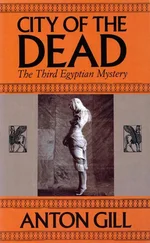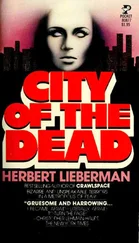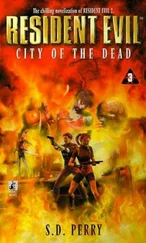Robert Sheckley - City of the Dead
Здесь есть возможность читать онлайн «Robert Sheckley - City of the Dead» весь текст электронной книги совершенно бесплатно (целиком полную версию без сокращений). В некоторых случаях можно слушать аудио, скачать через торрент в формате fb2 и присутствует краткое содержание. Жанр: Фэнтези, на английском языке. Описание произведения, (предисловие) а так же отзывы посетителей доступны на портале библиотеки ЛибКат.
- Название:City of the Dead
- Автор:
- Жанр:
- Год:неизвестен
- ISBN:нет данных
- Рейтинг книги:3 / 5. Голосов: 1
-
Избранное:Добавить в избранное
- Отзывы:
-
Ваша оценка:
- 60
- 1
- 2
- 3
- 4
- 5
City of the Dead: краткое содержание, описание и аннотация
Предлагаем к чтению аннотацию, описание, краткое содержание или предисловие (зависит от того, что написал сам автор книги «City of the Dead»). Если вы не нашли необходимую информацию о книге — напишите в комментариях, мы постараемся отыскать её.
City of the Dead — читать онлайн бесплатно полную книгу (весь текст) целиком
Ниже представлен текст книги, разбитый по страницам. Система сохранения места последней прочитанной страницы, позволяет с удобством читать онлайн бесплатно книгу «City of the Dead», без необходимости каждый раз заново искать на чём Вы остановились. Поставьте закладку, и сможете в любой момент перейти на страницу, на которой закончили чтение.
Интервал:
Закладка:
But no, they kept Sisyphus working. Sisyphus got a lot of wear but he didn't wear out because human spirit is eternal and a good thing too, it needs all the longevity it can get. Sisyphus used to go through a lot of boulders. Letting boulders fall back down the mountain was part of his job, so he can't be accused of wanton destruction. It's just that no one had thought through the ecological consequences. Because when he was on the mountaintop he would release the stone and it would roll down the mountain, what could be simpler. But they kept on having to bring him fresh boulders, and they finally even had to change his mountain, because he simply wore it away with his boulder-rolling. Sisyphus' boulders cut deeper and deeper paths into the mountainside, wearing a scalloped path and finally wearing it all away. So the people in charge of that sort of thing had to go all over trying to find suitable boulders for him to carry up. The boulder couldn't be just any slab or rock; it had to be quite round otherwise it wouldn't roll all the back way down to the bottom, except that sometimes it broke into pieces before it got there. And that also took its toll.
The camera swings into view again and considers for our delectation the mechanism of temptation. We dolly back to Tantulus in the nicest way we know how. We get serious for a moment. We know-what need to tell us again?-that the earthly vision consisted of fruits and roasted meats and other good things dangled from the branches of trees above Tantulus' head-tantalizingly-which they jerked back out of his reach when he reached for them. So of course after a while he didn't reach for them any more. But no one thought about that.
In any event, all that food had to be renewed almost daily, just the same as if he had made a meal of it. Because you can't tempt a man with a moldy roast and a bunch of rotten grapes. So you could say that in order for there to be a punishment, Tantulus, though he never tasted a morsel, still went through a hell of a lot of food.
And as times changed, and new certainties came and went, the style of his meals changed, also.
In the beginning they tempted him with simple fare: oat cakes, radishes and onions, and an occasional bit of roasted lamb. When a new administration came in, some thinking was done about all this.
"This classical hell of ours," one of the chief administrators pointed out at a recent meeting, "is an important interstellar tourist attraction. Millions of people come here nightly in their dreams. Millions more are brought here in one way or another. Even alien peoples come to visit us. We are an important exhibition, I could almost say a diorama of man's spirit. And it is necessary for us to put on a good show."
This became law and there was a great hustle and bustle in the halls of the administration of ancient halls and monuments. Everything had to be refurbished. In Tantulus' case, the whole exhibit was to be spruced up and this meant new menus. Cooks were trained to prepare the newer more modern meals that the menus called for, volunteers were not in sufficient supply so some people who were not actually cooks by any stretch of the imagination were especially condemned to do this work. But after a while the job acquired some panache and the finest chefs in the world vied to cook for Tantulus.
Tantulus found hanging from the branches of his tree items that he had never dreamed of before. In fact, special guides had to be assigned to explain to him what the offerings were, otherwise he wouldn't know what he was missing and his punishment would lose both efficacy and symbolic value. So they told him, "This is smoked boar in aspic, and this is pears bel Helene, and this is a compote of rare fruits." And so on and so on. And they waited anxiously to see how he responded to all this, and took notes, because Tantulus, after all, was the standard by which temptation was judged.
Tantulus quickly got into the spirit of connoisseurship that his work required. He knew he was an important cultural artifact. It was not small potatoes to realize that all temptation was to be judged by the effect it had on him. He was like the Smirnoff Man of the ancient world. He grew captious and difficult to please. With the succession of feasts that were put in front of him day after day, he became very knowledgeable in the preparation of foods. He didn't have to taste to know good from bad. He would complain bitterly when he detected by some means known only to himself that a spice was missing. "This turbot is entirely too peppery. This lamb, too bland by half, and adorned with the wrong kind of honey. This sauce, it has a bitter taste underneath it."
The cooks used to grow very angry at Tantulus. How, they asked, could he judge the food without tasting it? For of course the hellish mechanism made sure he never tasted anything. And Tantulus told them he did it first of all by the aroma, which he made sure to sniff, and secondly by the sheer powers of discrimination which had developed in his mind. "For look you, gentlemen, actually tasting these foods dulls the senses. I wouldn't taste your food if I were able to! But what I'm here for is to judge it, and I have to tell you that this meal was not up to snuff."
And that was the end of Persephone's reply to Hades, and she got back into the bullock wagon and let Demeter carry her back to the upper world. No eyewitnesses exist who can tell us what happened to the pomegranate seed she had had in her hand. But it is a fact that she returned to Hell and to her spouse, Hades, every fall, just as the world was turning dark and cold. Winter with tiny snow flakes came and went and soon the hounds of spring appeared in the upper valleys. I sat on my throne in hell and had dinners with Achilles and Helen and waited for Persephone to return. What was she doing, I wondered. What about that pomegranate seed? And just before she came back, at the very last possible instant, when I had used up all my hope and I had grown tired of thinking about the inhabitants of hell, I thought to myself, what I want is my Persephone. It's the beginning of winter now, and as I sit there on my iron throne, the taste of ashes in my mouth, I hear the faint sound of bells. And I know it heralds a blessed event, the arrival of my beloved, though you can never be sure.
Odysseus, the man of infinite stratagems, was in a tight place. The wily Greek hero had offended Poseidon, and the god was relentless in his pursuit. He had followed Odysseus across Attica and through the Dodecanese. Whenever Odysseus turned away from the islands, inland, trying to find a place where the sea and its ways were unknown, the sea god sent up powerful winds to drive him back down to the sea's edge. Nor was that all. He also sent cunning Thoughts, which pleaded with Odysseus as if they were he himself, and led him back to the water's edge. Here he was again where he would rather not be, on the strip of sand between the mountains and the water. It was here that Odysseus was to play out his final game. For this time the god of the sea had death in mind. He had postponed swatting this sucker long enough. It was time to press on with the killing.
The boom of the surf on the lonely sea beach.
The lilac line where sea and sky met.
Our last snapshot of Odysseus shows him as the heroic man, limbs dripping water, hair in his eyes, head bent, on all fours, with the wind ruffling his hair. As appetizing a sight as Nausicaa had ever seen.
Apparition at noon on the lone sea beach. Nausicaa and her maidens. Stopped dead in their tracks. Staring at the naked man.
"Where am I?" Odysseus said.
"This is Phaecea," Nausicaa said.
God she was cute.
Cute and deadly, unless I miss my guess.
Just the way I like them.
Odysseus shook his head irritably. Another romance shaping up-just what he didn't need! And besides, hadn't all this happened before? Hadn't his whole life happened before? Hadn't everything happened that could happen? And all of it before?
Читать дальшеИнтервал:
Закладка:
Похожие книги на «City of the Dead»
Представляем Вашему вниманию похожие книги на «City of the Dead» списком для выбора. Мы отобрали схожую по названию и смыслу литературу в надежде предоставить читателям больше вариантов отыскать новые, интересные, ещё непрочитанные произведения.
Обсуждение, отзывы о книге «City of the Dead» и просто собственные мнения читателей. Оставьте ваши комментарии, напишите, что Вы думаете о произведении, его смысле или главных героях. Укажите что конкретно понравилось, а что нет, и почему Вы так считаете.





